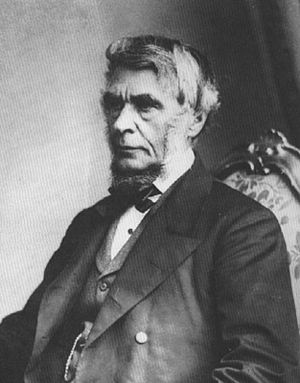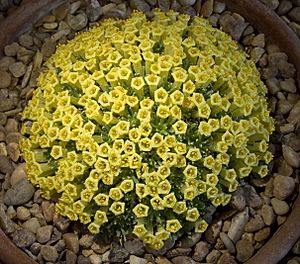George Bentham facts for kids
Quick facts for kids
George Bentham
|
|
|---|---|
 |
|
| Born | 22 September 1800 Stoke Damerel, Plymouth, England
|
| Died | 10 September 1884 (aged 83) London, England
|
| Spouse(s) | Sarah Jones |
| Awards | Royal Medal of the Royal Society in 1859 Clarke Medal of the Royal Society of New South Wales in 1879 |
| Scientific career | |
| Fields | Botany |
| Institutions | Royal Botanic Gardens, Kew |
| Author abbrev. (botany) | Benth. |
George Bentham (born September 22, 1800 – died September 10, 1884) was an important English botanist. He was known as one of the best plant scientists of the 1800s.
Even though he first studied law, George Bentham loved plants from a young age. He later became the president of the Linnean Society in 1861. He also became a member of the Royal Society in 1862.
Bentham wrote many important books about plants, especially about how to identify them. He is most famous for his work with Joseph Dalton Hooker. Together, they created a way to classify plants called Genera Plantarum (published from 1862 to 1883). He passed away in London in 1884.
Contents
Early Life and Education
George Bentham was born in Stoke, Plymouth, England, on September 22, 1800. His father, Sir Samuel Bentham, designed ships. His mother, Mary Sophia Bentham, was also a botanist and writer.
George did not go to a regular school. Instead, he learned a lot at home. He was very good at languages. By age seven, he could speak French, German, and Russian. He also learned Swedish when his family lived in Sweden for a short time.
The family traveled a lot, including a two-year stay in France. There, George studied Hebrew and math. They later settled near Montpellier, where his father bought a large estate.
Discovering Botany
While studying in France, George found a book called Flore française by A. P. de Candolle. This book had special tables to help identify plants. He tried it out on the first plant he saw, and it worked! From then on, he used this method for every plant he found.
In 1823, he met other English botanists in London. His uncle, Jeremy Bentham, wanted him to study law. George did become a lawyer in 1832, but he only handled one legal case.
His love for plants never faded. He became the secretary of the Horticultural Society of London from 1829 to 1840.
In 1832, George inherited money from his uncle, Jeremy Bentham. He had also inherited money from his father the year before. This meant he had enough money to follow his passions. These passions were botany, law, and logic.
George Bentham married Sarah Jones in 1833. They did not have any children. He died at his home in London on September 10, 1884, when he was 83 years old. He was buried in Brompton Cemetery.
Career and Discoveries
Changing Views on Evolution
George Bentham lived during a time when new ideas about how life changes were being discussed. His friend and colleague, Joseph Dalton Hooker, was a close friend of Charles Darwin. Darwin was the scientist who developed the theory of evolution by natural selection.
At first, Bentham believed that plant species never changed. But by 1874, he fully accepted Darwin's ideas. He wrote that "Fifteen years have been enough to prove the theory of evolution by natural selection." This change in thinking was very important for how plants were studied and grouped.
Awards and Recognition
George Bentham received many honors for his work.
- He was given the Royal Medal by the Royal Society in 1859.
- He became a Fellow of the Royal Society in 1862.
- He was the president of the Linnean Society of London from 1861 to 1874.
- In 1866, he became an honorary member of the American Academy of Arts and Sciences.
- He was also honored with the CMG in 1878.
- He received the Clarke Medal from the Royal Society of New South Wales in 1879.
Important Works
Bentham's first book about plants was Catalogue des plantes indigènes des Pyrénées et du Bas Languedoc (1826). He explored the Pyrenees mountains carefully to write this book. He always made sure to check facts himself, never just trusting what others said.
He also wrote about law and logic. One of his most important early works was Outline of a new system of logic (1827). This book introduced a new idea in logic that was very important. However, the publisher went out of business, and the book was forgotten for a long time.
In 1836, he published Labiatarum genera et species. To prepare for this book, he visited almost every plant collection in Europe.
From 1842, he worked on a large project called Prodromus Systematis Naturalis Regni Vegetabilis. This book described about 4,730 plant species.
In 1854, keeping his own plant collection and library became too expensive. He gave them to the government to help start the Royal Botanic Gardens, Kew's research facilities. He even thought about stopping his botanical work. But his friends convinced him to continue. From 1855, he worked at Kew Gardens five days a week for the rest of his life.
In 1857, the government decided to create books describing plants from British colonies. Bentham started with the Flora Hongkongensis in 1861. This was the first complete book about the plants of China and Hong Kong.
His next big project was the Flora Australiensis, which had seven volumes (1863–1878). This was the first complete plant guide for a whole continent.
His most famous work was the Genera Plantarum, which he started in 1862 and finished in 1883 with Joseph Dalton Hooker. This book described the classification of flowering plants.
Another very popular book was the Handbook of the British Flora, first published in 1858. Students used this book for over a hundred years! After his death, Joseph Dalton Hooker continued to edit it, and it became known as Bentham & Hooker.
Bentham is best known for his excellent system of classifying plants, especially flowering plants. This system, called the "Bentham & Hooker system", was published in Genera Plantarum.
Selected publications
- Bentham, George (February 1877). "On the Distribution of the Monocotyledonous Orders into Primary Groups, more especially in reference to the Australian Flora, with notes on some points of Terminology.". Journal of the Linnean Society of London, Botany 15 (88): 490–520. doi:10.1111/j.1095-8339.1877.tb00261.x. Zenodo: 1432977. https://zenodo.org/record/1432977.
Legacy
George Bentham's work had a lasting impact on botany. Many plants have been named in his honor.
Genera (Groups of Plants)
- Benthamia A.Rich.
- Benthamiella Speg.
Species (Individual Plant Types)
- Acanthocephalus benthamianus Regel
- Andropogon benthamianus Steud.
- Gardenia benthamianus F.Muell.
- Croton benthamianus Müll.Arg.
- Distemonanthus benthamianus Baill.
- Garcinia benthamiana (Planch. & Triana) Pipoly
- Nicotiana benthamiana Domin
- Pinus ponderosa ssp. benthamiana Hartw.
- Thelymitra benthamiana Rchb.f.
- Verbascum sinaiticum
See also
- Bentham & Hooker system
- Bentham's taxonomic arrangement of Adenanthos
- Bentham's taxonomic arrangement of Banksia
- Category:Taxa named by George Bentham
 | Georgia Louise Harris Brown |
 | Julian Abele |
 | Norma Merrick Sklarek |
 | William Sidney Pittman |


